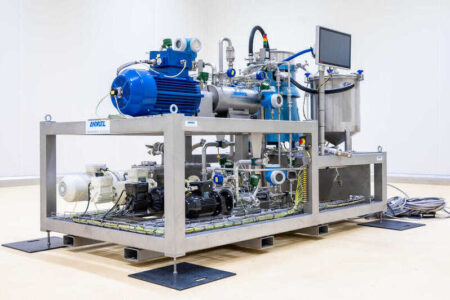Steamdry project targets low energy food drying
The Steamdry project, lead by HRS and a consortium of European SME’s, aims at developing a new drying plant to allow food producers and food processing SMEs to dry their foods with efficiency, high quality and sustainability.
This is done through new Dryer using Superheated Steam and low pressure technology, which ensures efficiency through better heat transfer and a better quality of product due to lower temperature. A two-step cleaning system removes the dust/particles from the extra steam and allows its reuse in the upstream process, reducing the energy bill. Food quality multi-sensor and process control is integrated in the process control, to monitor the food drying quality along with the energy balance of the system.
The process will enable the food processing machinery and food processing SMEs to recover their competitiveness via the production of high quality dried products, with lower process impact on energy environment. The project is being financed by the European Commission-Research Executive Agency (EC-REA), under the 7th program, which provides financial aid to small and medium enterprises (SMEs) to carry out Research & Development activities.
Under the terms of the contract, a consortium of small and medium enterprises (SMEs) had to be formed, including some Research Centre’s and a British University. The consortium partners are:
– SMEs participants: HRS HEAT EXCHANGERS SLU (as project coordinator), ARNOLD & PARTNER AG, AVENISENSE SAS and FIORDELISI SRL
– RTDs performers: TECNOLOGÍAS AVANZADAS INSPIRALIA SL, BRUNEL UNIVERSITY and FONDAZIONE PARCO TECNOLOGICO PADANO.
The Steamdry Project stems from the current trend in the EU market for processed foods: There is now an increasing demand by consumers for foods that have undergone fewer changes during processing, foods that look less processed and are closer to their original state while retaining high nutritive values, flavor and a “natural” image. These pressures are especially significant for a SME dominated sector. While dried foods represent more than €8 billion of sales in Europe, these sales are currently in stagnation or declining.
Food processing machinery SMEs must not only improve the drying process to achieve the high quality demanded across the EU customer base, but also they must tackle the energy consumption and pollution issues which are typical of such equipment.
For food machinery SMEs, now is the time to respond to these demands and enable the dried food industries to recover their competitiveness. To do so, they need to face 3 main challenges: Low quality of the final dried products (50% of the nutrients, vitamins and aroma are currently lost), high energy consumption to dry the raw materials (Conventional dryers have an efficiency of 40-60%) and significant environmental pollution (via odor and CO2 emissions).



